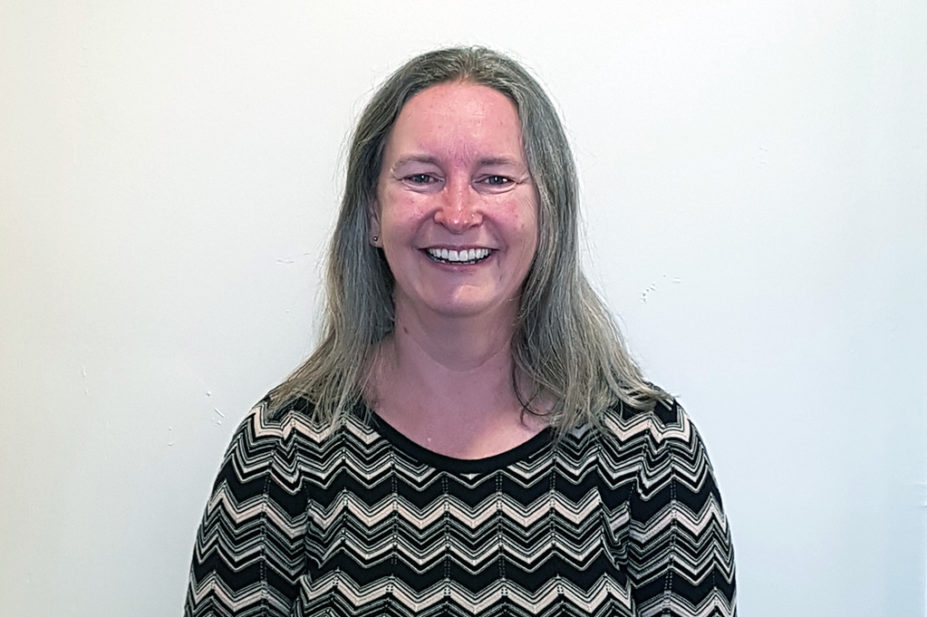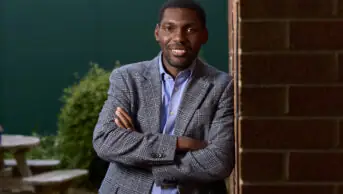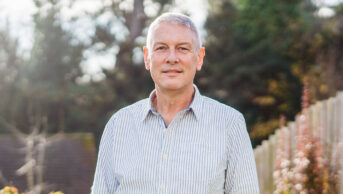
Courtesy of Katie Maddock
Katie Maddock has become the new chair of the Pharmacy Schools Council at a crucial time.
Universities are preparing for major changes to the MPharm degree programme, with students spending more time in clinical placements, the integration of prescribing training for all graduates by 2026, and a challenge from the Office for Students to reduce the ethnicity awarding gap.
However, Maddock, who is also head of the School of Pharmacy and Bioengineering at Keele University, appears unfazed. Perhaps this is because her own research looks at technology and the future of teaching.
Speaking to The Pharmaceutical Journal over Zoom, she admits that some of the changes will be hard to implement at first, but she is keen to emphasise that, ultimately, it will be very positive for those pharmacists in training and the wider pharmacy profession.
What are the major challenges for pharmacy schools at the moment?
The new learning standards from the General Pharmaceutical Council (GPhC) are coming down the tracks very rapidly. Implementing clinical placements is the biggest challenge; it is not insurmountable, but I think it will be a seismic shock to the profession and will be the piece of work that takes the most time, effort and energy, on everybody’s part, over the next two to three years.
But I do think that once it’s in there, people will become very used to the fact that probably, for 60–70% of the year, you will have a student present and that student will be of use to you. That’s what I’m really looking forward to getting to, that point of acceptance.
Pharmacy placements have traditionally been where students shadow and watch somebody doing something. That isn’t the way it should be, the students should be there to learn. And the best way to learn is to actually do things, make mistakes, integrate into a team and be part of that whole workplace environment.
Would you envisage a student doing a consultation or administering a vaccine?
There is no reason why a final year student couldn’t. We have to explain to the GPhC how we’re going to make this safe, but how many pharmacy students are trained up to be COVID-19 vaccinators anyway? What’s the difference? It’s the same technique. Once you’ve learned how to take somebody’s blood pressure, the key is to put them in a situation where they have to take the next step. They become very much like final year medical students on GP practice placements.
What are the barriers?
One of the big questions is indemnity, and that is something that schools of pharmacy can overcome quite easily, particularly if you’re in a faculty with other healthcare courses. Pharmacy is a risk-averse profession, but we have to move from risk aversion to risk management.
We are doing this piece of work with Health Education England on ‘entrustable professional activities’, deciding on levels of supervision. For example, if a student is learning how to take blood pressure, that would be something that’s done under direct supervision, but, after a certain number, they’re signed off as competent and can do it under lighter, indirect supervision.
I think we forget our origins. If you go back to how pharmacists started, it was an apprenticeship and they learned on the job and they went to lectures. The wheel is going round and we’re just reversing a 100-year-old trend, essentially.
Do you think the registration exam should move or be broken up?
We have to ask whether it is fit for the future. Sitting at the end of the fifth year, we’ve also got independent prescribing — do we also need a registration assessment then? If we do, what should it look like? Is it OK for a school of pharmacy to do the sign-off to get graduates into the foundation year, which is what we do at the moment? Or should there be another step? How do we still ensure and assure patient safety?
Nobody does calculations in a two-hour paper in a room on their own
The talk now in higher education is all about authentic assessment. Nobody does calculations in a two-hour paper in a room on their own. That’s not how you do it in practice; you’ll always have somebody to bounce the ideas off and double check your work. Calculations are essential, but at the end of the fifth year? It’s a bit harsh. Particularly if they have passed all the prescribing elements as well, which means they can practice.
Your research is in technology and how that can facilitate learning. How do you think that might change how pharmacy students are taught in future?
I think simulation is going to be a big part of undergraduate pharmacy training, as we move into the new interim learning outcomes. The opportunities there are to provide a safe space within a school of pharmacy, using whatever technology is appropriate.
At Keele University, we’ve got an avatar that we developed that is designed to have input from a pharmacy student, a nursing student, a medical student. It’s a 72-hour simulation, or you can compress it into a shorter timescale. We call it ‘Tamagotchi care’. The only way you can keep the patient alive is to make decisions. If you’re going to prescribe an antibiotic, you need to decide which one right, which route, what dose, for how long, taking into account all of the parameters that the patient has: renal function, liver function, allergies, etc. And it’s really tricky to keep them alive. That allows students to really draw on each other’s knowledge and experience, National Institute for Health and Care Excellence guidelines and local practice, and find a way through the problem, even with incomplete data.
What do you think the long-term effects of the pandemic will be?
I’m hoping that the high profile that the profession gained stays, because the general public didn’t really appreciate that the high street pharmacist is a clinician, but the pandemic really brought that out.
Data have shown that the ethnicity awarding gap in universities decreased during the pandemic. Were you aware of that?
We know how: it’s the move to online assessment. But the ‘why’ is going to take a few years to untangle.
We all had to move to online assessments of some sort. So, the philosophical question is: what was the difference? What was holding those students back in the first place? Is it a confidence thing? Is it that they are better at applying rather than regurgitating?
In theory, you’re asking students to apply their knowledge, because you can’t really stop them looking at resources, so you have to change the way you do things and the way you frame things. So, did we move to a more authentic form of assessment that allowed the students to really perform to the best of their abilities?
It’s health education institution-wide thing. It’s not just pharmacy, it’s happened across the board. And I know that people are really starting to dive into that next to try and find out what it was. We’re coming back to in situ assessments, and I think the public would be very upset if everything was online, and there was no way of guaranteeing that students haven’t just had somebody on the end of the phone answering the questions for them. That’s not great for public safety. But did we flip from some of our assessments into forms that allowed students to really shine? I think that’s probably the answer.
So, it wasn’t the case that everyone did badly?
It was a definite uplift. During the first year of the pandemic, you have to treat some of the data with a little bit of caution, because there were a lot of safety nets in place, but it will be very interesting to see what this year’s data looks like as we are back to normal assessments. We have to take the learning from that. It was very encouraging to see, and I do think a move to more authentic assessments is a good thing. How do we keep that authenticity and keep confidence in what we’re doing at the same time?
Do you think there should be more of an emphasis on sustainability in the degree programme?
I think it’s implicitly there. We really need to nail down what we mean by sustainability and pharmacy, because there are lots of facets to it. Obviously, the one that most people think about is medicines waste. So, you know, if we are training people to be good deprescribers, as well as prescribers, then there’s a sustainability element there. But we don’t badge it as sustainability, we badge it as good patient care.
Is there anything else you wanted to talk about?
The postgraduate environment is something that we need to be very cognisant of. With the changes that are coming with the undergraduate course, it’s changing the postgraduate environment hugely. The Royal Pharmaceutical Society are producing very useful frameworks and models, but they’re not the people who are employing people.
Is the traditional route of the clinical diploma still going to be viable? Is it going to be much more of a ‘pick and mix’ type of environment? We’ve also got that section of the profession that’s not yet qualified in independent prescribing, that are going to be competing against newly qualified independent prescribers in three, four years’ time, which must be very concerning for them, because it’s kind of blocking off part of the profession, simply because they graduated at the wrong time.
What would you like to see?
If the NHS is serious about the roles of clinicians in the future, including research to improve the NHS. One of the four pillars of clinical practice is research and we need to be a lot more serious about that as a profession.
There’s a role to expand pharmacists as clinical, quality improvement researchers
There’s a role definitely to expand pharmacists as clinical, quality improvement researchers. But that training has to be prioritised. I do wonder if doing a master’s-level qualification is going to be the expectation, but how is that going to be paid for? How do we free up people’s time to do a decent-sized research project? Those are big questions that I think the profession has to settle on.
Is there a hole in peer support?
I think so. The old Royal Pharmaceutical Society of Great Britain branch system used to be like an old boys’ club, but it was really useful, because you used to get some really inspiring speakers in from all sorts of professions. We’ve become quite a fractured profession once again, which is a shame, because now is the time when, actually, we need to be unified.
You’ve only got to look at the nursing profession, which always says: “Yeah, we’ll have a go at that.” They put themselves forward. Whereas pharmacy tends to think: “Oh, I’m not sure about that.” We leave ourselves behind, when, actually, we’ve got the skill set, the knowledge base, the opportunity. Imagine the healthcare impact we could have if we acted more collectively — it would be absolutely enormous.


